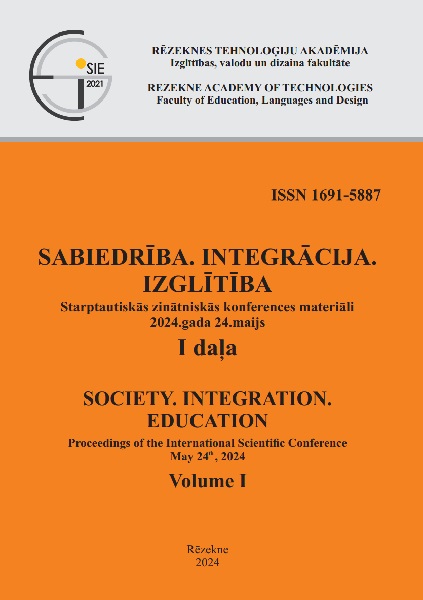INDIVIDUALISATION OF STUDENTS' LEARNING IN GRADES 5-8: EXPERIENCES OF TEACHERS
DOI:
https://doi.org/10.17770/sie2024vol1.7872Keywords:
general education teacher, learning methods, individualised learning, teachers’ experiencesAbstract
The article analyses the experiences of teachers in general education schools in the field of individualisation of students’ learning in grades 5–8. It theoretically discusses individualised learning strategies based on the guidelines of universal design for learning approach and teachers’ abilities in selecting approaches to individualise students’ learning. The implementation of individualised learning requires an increasing amount of theoretical and practical preparation of teachers in order to facilitate students' individualised learning. Teachers, therefore, need to explore innovative strategies and approaches to meet the broad and ever-changing learning needs of their students, to diversify their methods and to create dynamic learning experiences for their students. The analysis of the qualitative research findings has revealed that: teachers’ experiences of individualising students' learning are varied, conditioned by the ability to know the personal characteristics and abilities of the student; teachers’ experience of individualising teaching is characterised by a collaborative approach to dialogue and reflection; teachers’ insights into the strengths and weaknesses of their ability to individualise students' learning; and teachers’ insights into practical experiences of using the methods of individualisation.References
Bengtsson, M. (2016). How to plan and perform a qualitative study using content analysis. NursingPlus Open, 2, 8 – 14. Retrieved from: https://www.researchgate.net/publication/295303146_How_to_plan_and_perform_a_qualitative_study_using_content_analysis
Biggs, J., & Tang, C. (2011). Teaching for quality learning at university (4th Ed). Society for Research into Higher Education & Open University Press. Berkshire: Open University Press. Retrieved from: https://www.researchgate.net/publication/215915395_Teaching_for_Quality_Learning_at_University
Bitinas, B. (2013). Rinktiniai edukologiniai raštai [Selected educational writings]. Vilnius: Edukologija.
Bray, B. & McClaskey, K. (2012). Personalization vs differentiation vs individualization. US department of Education. Retrieved from: https://www.my-ecoach.com/online/resources/925/PersonalizationvsDifferentiationvsIndividualization.pdf
Campbell, R., Neelands, J., Hewston, R., Mazzoli, L., & Robinson, W. (2007). Personalised learning: Ambiguities in theory and practice. British Journal of Educational Studies, 55(2), 135-154.
Deakin Crick, R., Goldspink, C., & Foster, M. (2013). Telling identities: Learning as script or design? Learning emergency discussion paper. Retrieved from: https://www.researchgate.net/publication/281235988_Telling_Identities_learning_as_Script_or_Design
Deborah, L. J., Baskaran, R., & Kannan, A. (2014). Learning styles assessment and theoretical origin in an e-learning scenario: A survey. Artificial Intelligence Review, 42(4), 801–819. DOI: https://doi.org/10.1007/s10462-012-9344-0
Felder, R. M., & Brent, R. (2005). Understanding Student Differences. Journal of Engineering Education, 94(1), 57–72. DOI: https://doi.org/10.1002/j.2168-9830.2005.tb00829.x
Gaižauskaitė, I., & Valavičienė, N. (2016). Socialinių tyrimų metodai: kokybinis interviu [Social research methods: qualitative interviews]. Vilnius: Registrų centras.
Giota, J., Bergh, D., & Emanuelsson, I. (2019). Changes in individualized teaching practices in municipal and independent schools 2003, 2008 and 2014 - student achievement, family background and school choice in Sweden. Nordic Journal of Studies in Educational Policy, 78-91. DOI: https://doi.org/10.1080/20020317.2019.1586513
Helmke, A. (2012). Pamokos kokybė ir mokytojo profesionalumas: diagnostika, vertinimas, tobulinimas [Lesson quality and teacher professionalism: diagnosis, evaluation, improvement]. Vilnius: Standartų spaustuvė.
Hendry, G. D., Heinrich, P., Lyon, P. M., Barratt, A. L., Simpson, J. M., Hyde, S. J., & Mgaieth, S. (2015). Helping students understand their learning styles: Effects on study self-efficacy, preference for group work, and group climate. Educational Psychology, 25 (4), 395–407.
Hughey, J. (2020). Individual Personalized Learning. Educational Considerations, 46 (2), 59-70. https://doi.org/10.4148/0146-9282.2237
Kondratavičienė, R. (2018). Ugdymo turinio individualizavimas ir diferencijavimas naudojant virtualiąją mokymo(si) aplinką „EDUKA klasė” [Individualization and differentiation of educational content using the virtual learning environment "EDUKA class"]. Pedagogika, 130 (2), 131-147.
Kurilov, J. (2018). Personalizuoto mokymosi metodai ir technologijos. Monografija [Personalised learning methods and technologies. Monograph]. Vilnius: VGTU leidykla.
Kvieskienė, G., & Kvieska, V. (2018). Personalizuoto ugdymosi inovacijos ir sumanioji komunikacija [Innovations in personalized education and intelligent communication]. Socialinis ugdymas / Personalizuotas ugdymas visiems, 48 (1), 6–24 Personalizuoto ugdymosi inovacijos ir sumanioji komunikacija https://www.vdu.lt/cris/ bitstream/20.500.12259/108825/1/ISSN2351-6011_2018_V_48_N_1.PG_6-24.pdf
Mayer, R. E. (2017). How can brain research inform academic learning and instruction? Educational Psychology Review, 29(4), 835–846. https://www.researchgate.net/publication/309746798_How_Can_Brain_Research_Inform_Academic_Learning_and_Instruction
Monkevičienė, O., Sakadolskis, E., Bruzgelevičienė, R., Jakavonytė-Staškuvienė, D., Salienė, V., Toleikytė, N., & Zaleskienė, I. (2014). Ugdymo paradigmų iššūkiai didaktikai [Challenges of educational paradigms for didactics]. Vilnius: Lietuvos edukologijos universiteto leidykla.
Oddone, K., Hughes, H. E., & Lupton, M. (2019). Teachers as Connected Professionals. The International Review of Research in Open and Distributed Learning 20(3), 96-116. Retrieved from: https://www.researchgate.net/publication/334778869_Teachers_as_Connected_Professionals
Olsen, R. (2011). Understanding virtual pedagogies for contemporary teaching and learning. An ideaslab white paper. Retrieved from: https://psifiakesergasies.files.wordpress.com/2012/02/understanding_virtual_pedagogies_ideaslab.pdf
Poteliūnienė, S., Ustilaitė, S., Sabaliauskas, S., Česnavičienė, J., & Juškevičienė, A. (2019). Mokytojų patirtys įgyvendinant ugdymo turinį: mokytojas, kaip švietimo politikos dalyvis, mokyklos bendruomenės narys ir profesionalas [Teachers' experiences of curriculum implementation: the teacher as an actor in education policy, a member of the school community and a professional]. Pedagogika, 133 (1), 78–104. DOI: https://doi.org/10.15823/p.2019.133.5
Radović, V. Ž., Mihajlović de Oliviera, D. Z., & Todović, T. A. (2021). Individualization in Teaching – A Conceptual-Methodological Challenge for the Didactics Theory and Teaching Practice. Teaching Innovations, 34 (1), 63–79. Retrieved from: http://www.inovacijeunastavi.rs/wp-content/uploads/Inovacije1-21en/PR-05-Radovic.pdf
Šiaučiukėnienė, L., & Visockienė, O. (2013). Mokymo diferencijavimas edukacinės paradigmos kaitoje [Differentiating teaching in a changing educational paradigm]. Kauno Technologijų universitetas: Technologija.
UNESCO International Bureau of Education (2020). Personalized learning within teacher education: a framework and guidelines. Retrieved from: https://unesdoc.unesco.org/ark:/48223/pf0000374043
Wiles, R. (2012). What are qualitative research ethics? United Kingdom: Bloomsbury Publishing.






